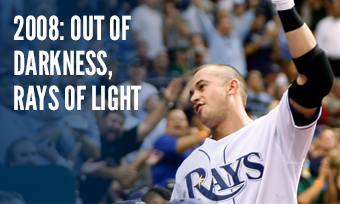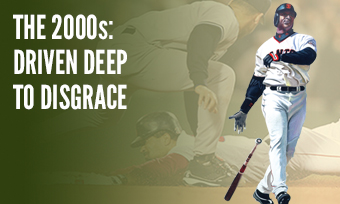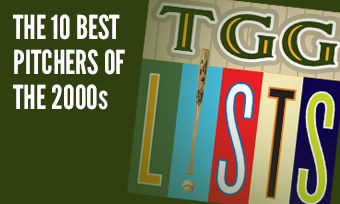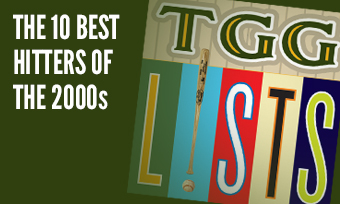The Yearly Reader
Leaders and Honors, 2008
Our list of baseball’s top 10 hitters and pitchers in both the American League and National League for the 2008 baseball season, as well as the awards and honors given to the game’s top achievers of the year.
The National League’s Top 10 Hitters, 2008
Bold type in brick red indicates league leader.
1. Albert Pujols, St. Louis
Key Numbers: .357 average, 100 runs, 187 hits, 44 doubles, 37 home runs, 116 RBIs, 104 walks, 34 intentional walks, .653 slugging percentage.
Despite a bum elbow that was thought to be in need of major reconstructive surgery, Pujols managed to continue his reign as the game’s scariest presence to opposing pitchers.
2. Lance Berkman, Houston
Key Numbers: .312 average, 114 runs, 173 hits, 46 doubles, 29 home runs, 106 RBIs, 99 walks, 18 stolen bases.
The Big Puma had a huge May, highlighted by a 17-game hit streak in which he batted a prodigious .543 with 13 multi-hit performances.
3. Chase Utley, Philadelphia
Key Numbers: .292 average, 113 runs, 177 hits, 41 doubles, 33 home runs, 104 RBIs, 27 hit-by-pitches, 14 stolen bases.
Utley saved his obscenities for formal occasions (All-Star introductions, World Series parades) while pitchers saved theirs for the many times they got hit hard by him.
4. David Wright, New York
Key Numbers: .302 average, 115 runs, 189 hits, 42 doubles, 33 home runs, 124 RBIs, 94 walks, 15 stolen bases, 11 sacrifice flies.
The most consumptive year for the all-time Met, setting (or tying) career marks in most major offensive categories.
5. Matt Holliday, Colorado
Key Numbers: 139 games, .321 average, 107 runs, 173 hits, 38 doubles, 25 home runs, 88 RBIs, 28 stolen bases, 2 caught stealing.
In his final year at Denver before being unceremoniously dumped on Oakland, Holliday hit over .300 both one mile high at home and at sea level everywhere else.
6. Ryan Ludwick, St. Louis
Key Numbers: .299 average, 104 runs, 40 doubles, 37 home runs, 113 RBIs.
A sudden spike for Ludwick, tying Albert Pujols for the team lead in home runs; not bad for a guy who averaged 21 homers per 162 games played over the rest of his career.
7. Ryan Howard, Philadelphia
Key Numbers: 162 games, .251 average, 105 runs, 26 doubles, 48 home runs, 146 RBIs, 81 walks, 199 strikeouts.
Many believed Howard should have earned the NL MVP for his late-season power surge that electrified the Phillies—but it was tough for voters to check his box knowing he was mired in the .220s as late as the end of August.
8. Hanley Ramirez, Florida
Key Numbers: .301 average, 125 runs, 177 hits, 34 doubles, 33 home runs, 67 RBIs, 92 walks, 35 stolen bases.
Given a rich contract extension—a totally foreign concept to Marlins owner Jeffrey Loria—Ramirez led a Florida infield in which each of its players hit at least 25 home runs, a major league first.
9. Carlos Beltran, New York
Key Numbers: .284 average, 116 runs, 172 hits, 40 doubles, 5 triples, 27 home runs, 112 RBIs, 92 walks, 25 stolen bases, 3 caught stealing.
Amongst other things, Beltran continued to be tough to tag out on a basestealing attempt; from 2000-08, he swiped 245 bags and was caught only 29 times—a mesmerizing 89% success rate.
10. Chipper Jones, Atlanta
Key Numbers: 128 games, .364 average, 82 runs, 24 doubles, 22 home runs, 75 RBIs, 90 walks, .470 on-base percentage.
At age 36, Jones took a .400 average well into June before a series of mishaps (including a freak batting cage incident that injured his eye) brought him back to reality. Historically, he belted his 400th home run and became only the second player (after Eddie Mathews) to hit at least 20 over each of his first 14 seasons.
The American League’s Top 10 Hitters, 2008
1. Josh Hamilton, Texas
Key Numbers: .304 average, 98 runs, 190 hits, 35 doubles, 5 triples, 32 home runs, 130 RBIs.
Tagged as a can’t-miss prospect before diving into a prolonged and deep substance-abuse binge, Hamilton became the year’s feel-good story with a clean-and-sober realization of his talent.
2. Alex Rodriguez, New York
Key Numbers: 138 games, .302 average, 104 runs, 33 doubles, 35 home runs, 103 RBIs, 14 hit-by-pitches, 18 stolen bases, .573 slugging percentage.
As steroid tattle-tale Jose Canseco murmured throughout the year that A-Rod might be on the juice, the Yankees star scored 100 runs for the 13th straight season—tying Lou Gehrig’s all-time AL mark. It would be Rodriguez’s last year in triple-digits.
3. Kevin Youkilis, Boston
Key Numbers: .312 average, 91 runs, 43 doubles, 29 home runs, 115 RBIs, 12 hit-by-pitches.
The future California brewmaster picked up the slugging slack for David Ortiz (struggling through a brief down period) and Manny Ramirez (who he wrestled with before watching him get sent away to the Dodgers).
4. Grady Sizemore, Cleveland
Key Numbers: .268 average, 101 runs, 170 hits, 39 doubles, 5 triples, 33 home runs, 90 RBIs, 98 walks, 11 hit-by-pitches, 38 stolen bases, 5 caught stealing.
The multi-faceted Sizemore peaked in Cleveland before numerous disabled list stays severely cut into his career.
5. Aubrey Huff, Baltimore
Key Numbers: .304 average, 96 runs, 182 hits, 48 doubles, 32 home runs, 108 RBIs.
The opinionated Huff felt the incentive to win back Orioles fans after calling Baltimore a “horses**t town” on Internet radio at the start of the season.
6. Carlos Quentin, Chicago
Key Numbers: 130 games, .288 average, 96 runs, 26 doubles, 36 home runs, 100 RBIs, 20 hit-by-pitches.
After failing to catch on for two years in Arizona, Quentin was traded to the White Sox and broke out—before breaking his hand when he tapped his bat too hard against it while at bat on the first day of September. His absence cost him the AL home run title; the Tigers’ Miguel Cabrera topped him by one.
7. Dustin Pedroia, Boston
Key Numbers: .326 average, 118 runs, 213 hits, 54 doubles, 17 home runs, 83 RBIs, 20 stolen bases, 1 caught stealing.
From the shadows of the Red Sox’ marquee mashers came the unlikely ascension of Pedroia, whose potency at the plate led to MVP honors in just his second full season.
8. Justin Morneau, Minnesota
Key Numbers: 163 games, .300 average, 97 runs, 187 hits, 47 doubles, 23 home runs, 129 RBIs, 16 intentional walks, 20 grounded into double plays.
Post-Home Run Derby curse? Morneau hit .323 with 14 home runs before the event, .267 with nine after. You decide.
9. Milton Bradley, Texas
Key Numbers: 126 games, .321 average, 78 runs, 32 doubles, 22 home runs, 77 RBIs, 80 walks, .436 on-base percentage.
The talented but ultra-turbulent Bradley, not to be confused with the maker of board games—though he could have been behind the game of “Trouble”—flourished in his latest of one/two-year tenures, though not surprisingly he found the time to be ejected a major league-high four times.
10. Ian Kinsler, Texas
Key Numbers: 121 games, .319 average, 102 runs, 165 hits, 41 doubles, 18 home runs, 71 RBIs, 26 stolen bases, 2 caught stealing.
The third-year Ranger hit full stride before his season was cut short in mid-August; he hit .413 with runners in scoring position and fashioned a 25-game hit streak that’s tied for the second-longest in franchise annals. Oddly, only four of his 18 homers were hit at offensive-minded Ranger Ballpark in Arlington.
The National League’s Top 10 Pitchers, 2008
1. Tim Lincecum, San Francisco
Key Numbers: 2.62 ERA, 18 wins, 5 losses, .783 win percentage, 33 starts, 227 innings, 265 strikeouts, 17 wild pitches, 20 stolen bases allowed, 23 grounded into double plays.
In his first full year, the lightweight Lincecum bucked the trend of big, strong-armed phenoms and blew away all comers toward the NL Cy Young Award.
2. Brandon Webb, Arizona
Key Numbers: 3.30 ERA, 22 wins, 7 losses, .759 win percentage, 34 starts, 226.2 innings, 12 hit-by-pitches, 24 stolen bases allowed, 25 grounded into double plays.
The Arizona ace won his first nine starts—making it 11 going back to the end of the previous season—and led the NL in wins for the second time in three years. In his first start of 2009, he shredded up his shoulder—and never pitched in the majors again.
3. Johan Santana, New York
Key Numbers: 2.53 ERA, 16 wins, 7 losses, .696 win percentage, 34 starts, 234.1 innings.
For the third straight even-numbered year—and his first with the Mets after eight years in Minnesota—Santana took home the league ERA crown.
4. CC Sabathia, Milwaukee
Key Numbers: 1.65 ERA, 11 wins, 2 losses, 17 starts, 7 complete games, 3 shutouts, 130.2 innings, 25 walks.
In between long stints with the Indians and Yankees, Sabathia was never better than during his brief, second-half existence with the Brewers, helping lead the club to its first playoff appearance in 26 years.
5. Brad Lidge, Philadelphia
Key Numbers: 1.95 ERA, 2 wins, 0 losses, 41 saves, 0 blown saves, 72 appearances, 69.1 innings, 8 stolen bases allowed.
Lidge’s perfect (no blown saves) stint on the mound may have been the true difference between Philadelphia making and not making the playoffs—yet he received only two first-place MVP votes.
6. Ryan Dempster, Chicago
Key Numbers: 2.96 ERA, 17 wins, 6 losses, .739 win percentage, 33 starts, 206.2 innings.
After three mediocre seasons trying (and mostly failing) to make it as a closer in Chicago, Dempster returned to his starting rotation roots and flourished—clinching 14 of his 17 wins at Wrigley Field.
7. Chad Billingsley, Los Angeles
Key Numbers: 3.14 ERA, 16 wins, 10 losses, 35 appearances, 32 starts, 200.2 innings, 10 wild pitches.
Defying a bad (0-4) start, the 23-year-old right-hander from Defiance, Ohio arguably grabbed the title of the year’s best pitcher at Chavez Ravine just as Clayton Kershaw entered the scene.
8. Derek Lowe, Los Angeles
Key Numbers: 3.24 ERA, 14 wins, 11 losses, 34 starts, 211 innings, 45 walks.
We say “arguably” for Billingsley given Lowe’s effort, which was, arguably, equally as good.
9. Jose Valverde, Houston
Key Numbers: 3.38 ERA, 6 wins, 3 losses, 44 saves, 7 blown saves, 74 appearances, 72 innings, 8 stolen bases allowed.
The Astros may have lost Brad Lidge to the eventual world champion Phillies, but Valverde eased his departure by saving more games (and yes, blowing more as well).
10. Dan Haren, Arizona
Key Numbers: 3.33 ERA, 16 wins, 8 losses, 33 starts, 216 innings, 40 walks, 11 wild pitches.
The increasingly pricey Haren, who always seemed good for a 15-10-ish year, wasn’t fazed by a change of scenery after being shipped to the Diamondbacks from Oakland.
The American League’s Top 10 Pitchers, 2008
1. Cliff Lee, Cleveland
Key Numbers: 2.54 ERA, 22 wins, 3 losses, .880 win percentage, 31 starts, 223.1 innings, 32 walks, 27 grounded into double plays.
From sigh to Cy: Few pitchers have rebounded from rough times like Lee, the ace of all AL aces a year after finishing 5-8 with a 6.29 ERA.
2. Roy Halladay, Toronto
Key Numbers: 2.78 ERA, 20 wins, 11 losses, 33 starts, 246 innings, 9 complete games, 39 walks, 12 hit-by-pitches, 21 grounded into double plays.
Halladay, who collected 20 triumphs for the second time in his career, became the first pitcher since 1974 to beat the Yankees five times.
3. Jon Lester, Boston
Key Numbers: 3.21 ERA, 16 wins, 6 losses, .727 win percentage, 33 starts, 210.1 innings, 10 hit-by-pitches, 27 grounded into double plays.
Battling lymphoma just 18 months earlier, the young Boston southpaw threw the AL’s only no-hitter of the season, May 19 against Kansas City.
4. Francisco Rodriguez, Los Angeles of Anaheim
Key Numbers: 2.24 ERA, 2 wins, 3 losses, 62 saves, 7 blown saves, 76 appearances, 68.1 innings, 8 stolen bases allowed.
Possessing one of the wildest pitching deliveries ever seen, the Angels closer’s one-of-a-kind record-breaking campaign was thoroughly consistent; he appeared from 12-to-13 games and saved 9-to-12 games per month.
5. Mike Mussina, New York
Key Numbers: 3.37 ERA, 20 wins, 9 losses, .690 win percentage, 34 starts, 200.1 innings, 31 walks, 24 grounded into double plays.
After 17 years of coming close, Mussina finally snagged his first 20-win campaign in the final start of his career; he thus became the first pitcher since Sandy Koufax to win at least 20 in his last year.
6. Mariano Rivera, New York
Key Numbers: 1.40 ERA, 6 wins, 5 losses, 39 saves, 1 blown save, 64 appearances, 70.2 innings, 6 walks.
Almost Brad Lidge; Rivera suffered only one blown save for the only time in his career, doing so in a game the Yankees ultimately won in extra innings.
7. Justin Duchscherer, Oakland
Key Numbers: 2.54 ERA, 10 wins, 8 losses, 22 starts, 141.2 innings, 34 walks.
A decent reliever for much of the decade, Duchscherer was given a shot in the rotation and surprised all the way to the All-Star Game—but an August hip injury ended his season early. Elbow surgery and a bout with clinical depression the following year essentially ended his career.
8. Daisuke Matsuzaka, Boston
Key Numbers: 2.90 ERA, 18 wins, 3 losses, .857 win percentage, 29 starts, 167.2 innings, 94 walks.
In his second year with the Red Sox after making a splash in Japan, Matsuzaka clamped down on opposing hitters’ ability to hit (they batted only .211 against him), but the walks hurt; still, his 18 wins are the most yet by a Japan-born pitcher.
9. Joe Saunders, Los Angeles of Anaheim
Key Numbers: 3.41 ERA, 17 wins, 7 losses, .708 win percentage, 31 starts, 198 innings, 28 grounded into double plays.
A winless August is all that kept Saunders from likely grabbing 20 wins, and kept his career-low ERA from diving even further down.
10. Jonathan Papelbon, Boston
Key Numbers: 2.34 ERA, 5 wins, 4 losses, 41 saves, 5 blown saves, 67 appearances, 69.1 innings, 8 walks.
The animated closer saved a career-high 41 games, though he still had to do his homework on AL East teams—whom he posted a meh 3.72 ERA against.









